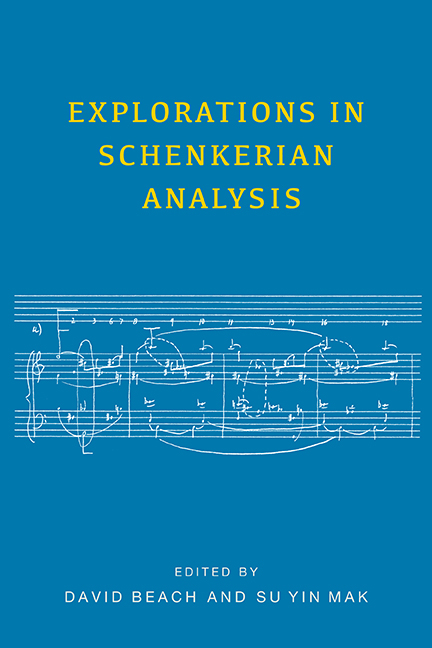Book contents
- Frontmatter
- Contents
- Preface
- Part One Eighteenth Century
- 1 A Letter about the C-Major Fugue from The Well-Tempered Clavier, Book 1
- 2 The Opening Tonal Complex of Bach's St. Matthew Passion: A Linear View
- 3 Recurrence and Fantasy in C. P. E. Bach's Rondo in G Major
- 4 Voice-Leading Procedures in Galant Expositions
- 5 The First Movements of Anton Eberl's Symphonies in E-flat Major and D Minor, and Beethoven's Eroica: Toward “New” Sonata Forms?
- Part Two Early Nineteenth Century
- Part Three Late Nineteenth Century
- Appendix: An Interview with Edward Laufer
- List of Contributors
- Index
3 - Recurrence and Fantasy in C. P. E. Bach's Rondo in G Major
from Part One - Eighteenth Century
Published online by Cambridge University Press: 28 June 2018
- Frontmatter
- Contents
- Preface
- Part One Eighteenth Century
- 1 A Letter about the C-Major Fugue from The Well-Tempered Clavier, Book 1
- 2 The Opening Tonal Complex of Bach's St. Matthew Passion: A Linear View
- 3 Recurrence and Fantasy in C. P. E. Bach's Rondo in G Major
- 4 Voice-Leading Procedures in Galant Expositions
- 5 The First Movements of Anton Eberl's Symphonies in E-flat Major and D Minor, and Beethoven's Eroica: Toward “New” Sonata Forms?
- Part Two Early Nineteenth Century
- Part Three Late Nineteenth Century
- Appendix: An Interview with Edward Laufer
- List of Contributors
- Index
Summary
Carl Phillip Emanuel Bach's capstone collection of sonatas, fantasies, and rondos für Kenner und Liebhaber represents a kind of summa of his experimentation and, arguably, the most successful products of it. That experimentation is easily observed in the rondos found throughout these sets; as is well known, these rondos violate the common practice of the rondo refrain as touchstone of the tonic. Instead, it is not uncommon for the refrain to appear in keys that are distantly—even bizarrely—removed from the home key. As such, they would seem to undermine the very formal principle that grounds the rondo, that of thematic and tonal recurrence.
The Rondo in G Major (H. 268, Wq 59/2) will be our case in point. Besides the accustomed tonic and dominant, its refrain appears, rather weakly prepared, in the confoundingly unrelated keys of F major and E major. The impact of these distant transpositions is not cushioned by the shift to a fantasylike discourse; rather, the middle section of this piece convolutes like a labyrinth, its tonal vagaries seeming that much more aimless and lost. It would be a sufficient challenge merely to explain how tonality coheres in the face of Bach's radical experimentation.
Yet this rondo raises other issues larger even than tonal coherence. I have already alluded to the role of recurrence in the typical rondo form. Surely the rondo is about nothing else if not the restatement of a central idea, about touching base on the tonic before gearing up for another excursion. Fantasy would seem to be the very antithesis of this central idea: it would seem to be nothing but excursus, unplanned, not looking back, always seeking something new. And it is not simply that Bach's G-major Rondo juxtaposes these two principles. The rondo's first extended foray into fantasy-like passagework strikes one as just that—a simulation of free improvisation—but it is curious that this illusion is dispelled when a vast swatch of the fantasy section is repeated in near-exact transposition.
- Type
- Chapter
- Information
- Explorations in Schenkerian Analysis , pp. 26 - 41Publisher: Boydell & BrewerPrint publication year: 2016



